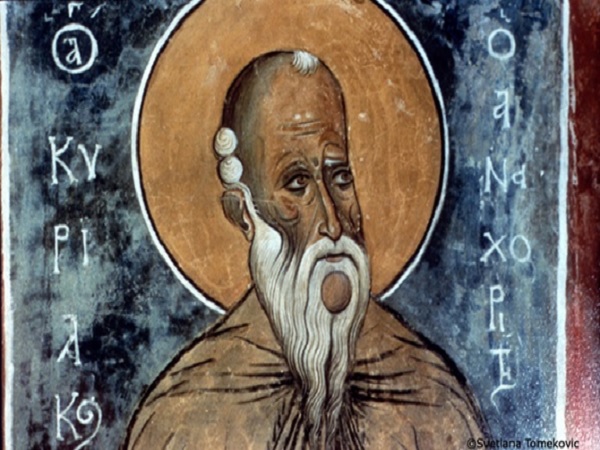Saint Kyriakos the Anachorite (29 September)
30 September 2016Today the Church honours and celebrates the sacred memory of Saint Kyriakos the Anchorite. Saint Kyriakos was born in Corinth in 408. His father was called Ioannis and was a priest, while his mother was called Evdoxia. The then Bishop of Corinth, Petros, who was Kyriakos’ uncle on his father’s side, made him a reader. Kyriakos wasn’t at ease in Corinth, however, and so at the age of eighteen he left for Jerusalem. At that time there were a lot of monasteries, as well as great ascetics, and it was Kyriakos’ wish to live with them. By God’s grace, he was drawn to the life of a hermit.
On his way to Jerusalem, Saint Kyriakos encountered Saint Efthymios, who made him a monk and sent him to Saint Yerasimos the Jordanite. Saint Efthymios and Saint Yerasimos were great names in the history and life of asceticism. Kyriakos lived with both of them, particularly with Saint Yerasimos, who kept him close by his side. When Saint Yerasimos fell asleep in the Lord, Kyriakos went back to Saint Efthymios. Not that it mattered where he was. Kyriakos always performed his duties willingly and without complaint, because he always bore in mind the words of God: ‘Cursed are those who perform the works of the Lord negligently’.
 When he returned to the monastery of Saint Efthymios, Kyriakos was ordained priest. He remained there for many years and was so meek and ascetic that no-one ever saw him becoming angry, or even eating. He ate as little as was necessary to stay alive, in the evening, when he retired to his cell. When he was seventy years old, Kyriakos left the monastery for the desert and then, when he was seventy-nine, left even there to go deeper into the desert, his constant companion and protection being a lion. We shouldn’t forget that, before the Fall, beasts which are now wild lived in harmony with people in Paradise.
When he returned to the monastery of Saint Efthymios, Kyriakos was ordained priest. He remained there for many years and was so meek and ascetic that no-one ever saw him becoming angry, or even eating. He ate as little as was necessary to stay alive, in the evening, when he retired to his cell. When he was seventy years old, Kyriakos left the monastery for the desert and then, when he was seventy-nine, left even there to go deeper into the desert, his constant companion and protection being a lion. We shouldn’t forget that, before the Fall, beasts which are now wild lived in harmony with people in Paradise.
Saint Kyriakos went to his rest in the Lord at the age of one hundred and seven and, until the end, was as ascetic and free from bodily cares as he always had been. Even though so well stricken in years, he still had his faculties, as though he was a mere stripling. He was a big man, handsome and graceful in his movements, very well-respected and imposing. He was very approachable, because he was gentle and good-hearted. He was given the name ‘anchorite’ because he didn’t stay in one place or monastery: he went from Saint Efthymios to Saint Yerasimos, then back to Saint Efthymios, from there into the desert and on into a deeper desert.
It can be seen from the lives of the Saints and from modern science as well, that restraint and moral purity are factors in people’s bodily health and their longevity. Most of the bodily illnesses which afflict people and make them old before their time are the result of moral misdemeanours and abuses. On the other hand, people who respect their body as an animate temple of God and who don’t enslave themselves to the passions live and die at a ripe old age. Saint Kyriakos was one hundred and seven years old and had all his faculties and enjoyed robust health.
But it’s true that, in today’s world, there’s not a lot of weight given to asceticism. Nowadays most people are very concerned with their bodies, though they don’t realize how they should really respect and love their bodies. They’re very extrovert and self-serving. The last thing they want to hear is about crucifying the flesh, self-denial, voluntary poverty and deprivation, obedience and humility. But this is what asceticism is. This is the way of life of those whom Christ calls ‘violators’: ‘The kingdom of heaven has suffered violence, and the violent take it by force’. One of the greatest ascetics and violators of the kingdom of God is Saint Kyriakos the Anchorite. Amen.
(Metropolitan Dionysios of Servia and Kozani, Εικόνες έμψυχοι, Apostoloki Diakonia, pp.129-31)






